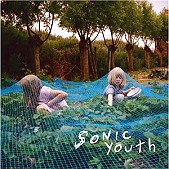
|  |  |  |  |
Sonic Youth
Murray Street (DGC)
By: Stan Hall

 The best Sonic Youth songs are the ones that start out as such ordinary songs -- agreeable guitar rock that sounds like it might stick to some sort of recognizable verse-chorus-bridge structure. But since this is Sonic Youth, you know that the song is going to take some, well, sonic flight. And even though you know it's coming, you're still surprised by the song's digression, how imaginative it is, how it turns what could be a pedestrian song into something epic, something individual, something beautiful. And by the song's end, even though you've forgotten how it began, you know it's designed that way. This is the rare band that's most interesting when it just jams. The best Sonic Youth songs are the ones that start out as such ordinary songs -- agreeable guitar rock that sounds like it might stick to some sort of recognizable verse-chorus-bridge structure. But since this is Sonic Youth, you know that the song is going to take some, well, sonic flight. And even though you know it's coming, you're still surprised by the song's digression, how imaginative it is, how it turns what could be a pedestrian song into something epic, something individual, something beautiful. And by the song's end, even though you've forgotten how it began, you know it's designed that way. This is the rare band that's most interesting when it just jams."Murray Street" is one of the Youth's more introspective, quiet works. Perhaps this is the result of recording on their home turf of New York City during those trying times of fall 2001, or maybe it's the influence of producer/multi-instrumentalist Jim O'Rourke, now officially the band's fifth member. Nevertheless, although it doesn't make much of a fuss, "Murray Street" is still a pretty swell listening experience, the Youth's best effort since "Washing Machine." And though it doesn't match the heights of masterworks such as "Sister" and "Daydream Nation," it does share those albums' ability to keep one foot in mainstream song structures, the other in avant-garde experimentation, and come out smelling like roses on both ends. The first track, "Empty Page," most resembles a conventional song, pulling you along unassumingly before exploding, albeit briefly, into the sort of cat-scratch fretboard frenzy for which Sonic Youth is well known. "Disconnection Notice" has an appealingly world-weary Thurston Moore vocal and lyrics presenting a utility stop-service notice as a metaphor for withdrawing from the world completely. This song, like most of the other tracks (only seven total), is more than six minutes long and features long, highly textured, almost ambient instrumental passages, but these parts are so well thought-out and inspired that they keep your attention (though these tracks work equally well as background hum). Lee Ranaldo's contribution, the 11-minute-plus "Karen Revisited," is the best track here, a tightly clenched, weirdly catchy ball of fuzz guitar that pushes and pulls restlessly before drifting out on a soft cloud of drone. Not everything on "Murray Street" is hunky dory. The album, as short as it is, does lose a measure of its momentum near its conclusion. And while singing never has been Sonic Youth's forte, some tracks sport some truly lousy vocals, especially the two sung by Kim Gordon. But in the face of all this spectacular guitar playing, it seems overly critical to focus on an aspect that's clearly secondary among the band's aims. Sonic Youth keeps getting older -- Gordon will likely be 50 by their next album -- but on "Murray Street," they appear to be getting a second wind. It seems perfectly likely that in a couple of decades we'll see this band as a bunch of geriatrics up onstage, doing exactly the kind of music they're doing now. All the teens and twenty-somethings in the crowd, who weren't even alive when "Daydream Nation" was released, will agree: These are the world's coolest old people. Rating: B+
|
|
|  |  |
Copyright © 1997-2026, In Music We Trust, Inc. All Rights Reserved. |
 |
|

